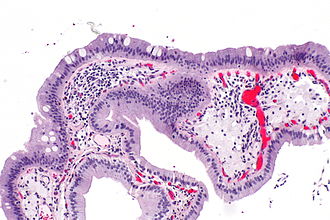Difference between revisions of "Intestinal metaplasia of the gallbladder"
Jump to navigation
Jump to search
| Line 78: | Line 78: | ||
- NEGATIVE FOR DYSPLASIA. | - NEGATIVE FOR DYSPLASIA. | ||
</pre> | </pre> | ||
===Micro=== | |||
The sections show gallbladder wall with mild chronic inflammation and entrapped epithelial | |||
crypts, that focally extend through the muscularis. The entrapped deep crypts have no | |||
apparent nuclear atypia, and no apparent mitotic activity. | |||
A very small focus of intestinal metaplasia is present in the surface epithelium. No dysplasia is identified. | |||
==See also== | ==See also== | ||
Revision as of 20:58, 9 January 2014
| Intestinal metaplasia of the gallbladder | |
|---|---|
| Diagnosis in short | |
 Gallbladder with intestinal metaplasia. H&E stain. | |
|
| |
| LM | gallbladder mucosa with goblet cells +/-Paneth cells |
| LM DDx | gallbladder dysplasia, gallbladder carcinoma |
| Stains | Alcian blue stain +ve |
| Site | gallbladder |
|
| |
| Associated Dx | chronic cholecystitis |
| Prognosis | benign, increased risk of carcinoma |
Intestinal metaplasia of the gallbladder is a pathology of the gallbladder associated with an increased risk of gallbladder carcinoma.
It is also known as gallbladder intestinal metaplasia.
General
- Associated with chronic cholecystitis.[1]
- Not associated with acute cholecystitis.
Significance:
- Increased risk of carcinoma.[2]
Gross
- No specific changes.
Note:
- Usually seen in the context of chronic cholecystitis if isolated.
Microscopic
Features:[3]
- Goblet cells - key feature.
- +/-Paneth cells.[4]
Note:
- Often accompanied by antral type metplasia.
- Gastric antral-type epithelium - may form glands.
DDx:
- Gallbladder adenocarcinoma.
- Gallbladder adenoma (gallbladder dysplasia).
Images
www:
Stains
- Alcian blue/PAS +ve.
Sign out
GALLBLADDER, CHOLECYSTECTOMY: - INTESTINAL METAPLASIA OF THE GALLBLADDER, FOCAL. - CHRONIC CHOLECYSTITIS. - CHOLELITHIASIS. - NEGATIVE FOR DYSPLASIA.
Micro
The sections show gallbladder wall with mild chronic inflammation and entrapped epithelial crypts, that focally extend through the muscularis. The entrapped deep crypts have no apparent nuclear atypia, and no apparent mitotic activity.
A very small focus of intestinal metaplasia is present in the surface epithelium. No dysplasia is identified.
See also
References
- ↑ Sai, K.; Kajiwara, H. (2001). "An immunohistochemical study of metaplastic endocrine cells in human gallbladder cancer.". J Hepatobiliary Pancreat Surg 8 (5): 453-60. PMID 11702256.
- ↑ Duarte, I.; Llanos, O.; Domke, H.; Harz, C.; Valdivieso, V. (Sep 1993). "Metaplasia and precursor lesions of gallbladder carcinoma. Frequency, distribution, and probability of detection in routine histologic samples.". Cancer 72 (6): 1878-84. PMID 8364865.
- ↑ Albores-Saavedra, J.; Nadji, M.; Henson, DE.; Ziegels-Weissman, J.; Mones, JM. (Jun 1986). "Intestinal metaplasia of the gallbladder: a morphologic and immunocytochemical study.". Hum Pathol 17 (6): 614-20. PMID 2872152.
- ↑ Mills, Stacey E; Carter, Darryl; Greenson, Joel K; Oberman, Harold A; Reuter, Victor E (2004). Sternberg's Diagnostic Surgical Pathology (4th ed.). Lippincott Williams & Wilkins. pp. 1789. ISBN 978-0781740517.
- ↑ Mukhopadhyay, S.; Landas, SK. (Mar 2005). "Putative precursors of gallbladder dysplasia: a review of 400 routinely resected specimens.". Arch Pathol Lab Med 129 (3): 386-90. doi:10.1043/1543-2165(2005)129386:PPOGDA2.0.CO;2. PMID 15737036.


